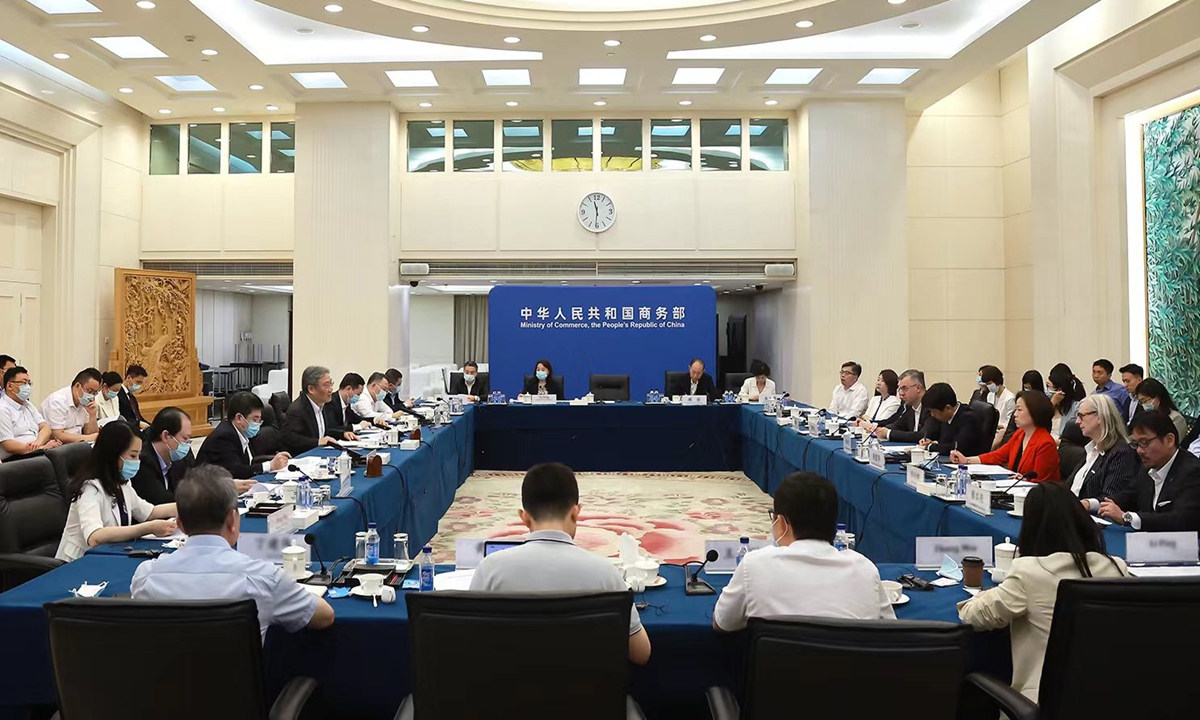
Photo: Screenshot of the website of China's Ministry of Commerce
The Chinese government considers attracting foreign investment to be of great importance and continuously strives to improve the business environment, China's Minister of Commerce (MOFCOM) Wang Wentao said while chairing a roundtable meeting with representatives of foreign pharmaceutical companies on Wednesday.
Representatives from 12 companies, including GE Healthcare, Novo Nordisk, Bayer, Merck, Roche, AstraZeneca, and Pfizer, attended the meeting.
Wang said that China is comprehensively promoting its own modernization and steadfastly advancing a high-level opening-up, which will bring more development opportunities for foreign enterprises, including those in the pharmaceutical industry.
Wang heard about business operations, issues, demands, and suggestions of the foreign companies in China.
During the meeting on Wednesday, Wang also said that MOFCOM has upgraded the establishment of the roundtable meeting system for foreign enterprises based on the existing regular communication mechanism, leveraging the coordination service mechanism for foreign trade and investment.
"Through this institutional arrangement, we will hold regular meetings to further expand channels for learning about issues and hearing suggestions, and respond promptly to address the concerns of enterprises, and support the long-term and stable development of foreign enterprises in China," Wang told the representatives of foreign companies.
Also on the same day, Chen Jining, the secretary of the Shanghai Municipal Committee of the Communist Party of China, met with a delegation led by Belén Garijo, chair of the Executive Board and CEO of Merck, during which Chen welcomed the German-based company to seize opportunities and increase investment in research and development in Shanghai.
Garijo told Chen that Merck is full of confidence in China's future development and remains committed to long-term investments in the country, without any intention to change this commitment.
On the sidelines of the intensive meetings between high-level government officials and world's leading healthcare companies, cooperative agreements were also inked, mirroring the growing emphasis of foreign firms on the Chinese market both in words and deeds.
US biotech company Moderna inked new deals with its Chinese partners on Wednesday that will enable the company's business expansion in China, the Global Times learned from the US firm in
an exclusive written interview.
The agreements are focused on strengthening health security by targeting "unmet needs and contributing to the ecosystem of medical solutions" available to patients in China, Luke Mircea-Willats, senior director, Media Relations and Communications of Moderna International, noted.
Mircea-Willats told the Global Times that "any medicines produced under this agreement will be exclusively for the Chinese people - who face many of the same health challenges that affect other communities around the world - and will not be exported."
The Chinese pharmaceutical market had been experiencing significant growth in recent years, attracting multinational companies to expand their presence in China. Companies like AstraZeneca, Pfizer and Johnson & Johnson have all announced plans to increase their investments and expand their operations in China.
China, as the world's second-largest pharmaceutical market, remains attractive to foreign pharmaceutical companies, despite challenges regarding the payment capabilities for patented drugs and some other factors, Wang Xuegong, deputy director of the China Pharmaceutical Enterprises Association, told the Global Times on Wednesday.
"Domestic demand is primarily driven by a large population, aging demographics, high incidence of various diseases, and an ongoing trend of improving healthcare coverage," Wang said.
The overall size of the pharmaceutical market in China has shown a general upward trend. Data indicates that the market size increased from 1.46 trillion yuan ($200 billion) in 2017 to 1.85 trillion yuan in 2022, with a compound annual growth rate of 4.9 percent, industry research website askci.com reported. It is projected to reach nearly 2 trillion yuan in 2023.




